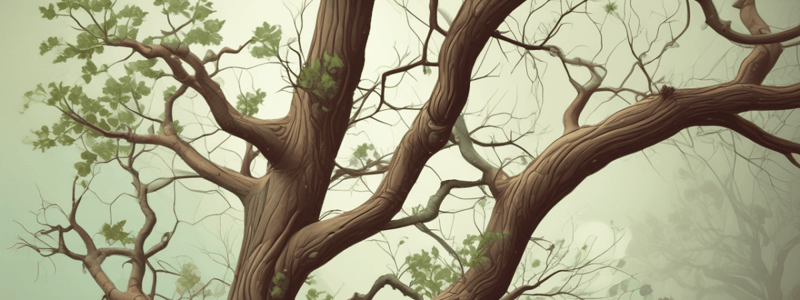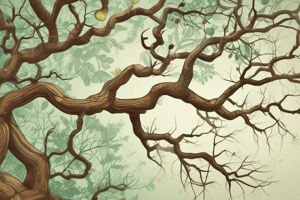Podcast
Questions and Answers
What is the study of microorganisms, such as bacteria, viruses, and fungi? Change
What is the study of microorganisms, such as bacteria, viruses, and fungi? Change
- Botany
- Ecology (correct)
- Microbiology (correct)
- Genetics
What is the term for the chemical processes that occur within living organisms? Change
What is the term for the chemical processes that occur within living organisms? Change
- Cell Biology
- Biochemistry (correct)
- Molecular Biology
- Ecology
What is the term for the movement of molecules and ions across cell membranes?
What is the term for the movement of molecules and ions across cell membranes?
- Homeostasis
- Metabolism
- Transport (correct)
- Photosynthesis
What is the term for the ability of an organism to maintain a stable internal environment?
What is the term for the ability of an organism to maintain a stable internal environment?
What is the term for the process by which plants convert light energy into chemical energy?
What is the term for the process by which plants convert light energy into chemical energy?
What is the term for the process by which cells generate energy from glucose?
What is the term for the process by which cells generate energy from glucose?
What is the term for the study of the relationships between different species?
What is the term for the study of the relationships between different species?
What is the term for the process by which a new species emerges from an existing one?
What is the term for the process by which a new species emerges from an existing one?
Flashcards
Botany
Botany
The study of plants, including their structure, growth, evolution, and classification.
Zoology
Zoology
The study of animals, including their structure, behavior, evolution, and classification.
Ecology
Ecology
The study of the interactions between organisms and their environment.
Photosynthesis
Photosynthesis
Signup and view all the flashcards
Cellular Respiration
Cellular Respiration
Signup and view all the flashcards
Natural Selection
Natural Selection
Signup and view all the flashcards
Adaptation
Adaptation
Signup and view all the flashcards
Fossil Record
Fossil Record
Signup and view all the flashcards
Study Notes
Branches of Biology
- Botany: study of plants, including their structure, growth, evolution, and classification
- Zoology: study of animals, including their structure, behavior, evolution, and classification
- Microbiology: study of microorganisms, such as bacteria, viruses, and fungi
- Ecology: study of the interactions between organisms and their environment
- Biochemistry: study of the chemical processes that occur within living organisms
- Molecular Biology: study of the structure and function of biomolecules, such as DNA and proteins
- Cell Biology: study of the structure and function of cells
- Genetics: study of heredity, genes, and genetic variation
- Evolutionary Biology: study of the processes that have shaped the diversity of life on Earth
Biological Molecules
- Carbohydrates: sugars, starches, and fibers that provide energy and structure
- Proteins: complex molecules that perform a wide range of functions, including enzymatic, structural, and transport roles
- Lipids: fats, oils, and waxes that provide energy and structure
- Nucleic Acids: DNA and RNA, which contain genetic information
- ATP: adenosine triphosphate, the energy currency of the cell
Cellular Structure and Function
- Cell Membrane: semi-permeable membrane that surrounds the cell
- Cytoplasm: jelly-like substance inside the cell membrane
- Nucleus: membrane-bound organelle that contains genetic material
- Mitochondria: organelles responsible for generating energy through cellular respiration
- Endoplasmic Reticulum: network of membranous tubules and cisternae involved in protein synthesis and transport
- Ribosomes: site of protein synthesis
Biological Processes
- Photosynthesis: process by which plants convert light energy into chemical energy
- Cellular Respiration: process by which cells generate energy from glucose
- Metabolism: set of chemical reactions that occur within cells to maintain life
- Homeostasis: ability of an organism to maintain a stable internal environment
- Transport: movement of molecules and ions across cell membranes
Evolution
- Natural Selection: process by which individuals with favorable traits are more likely to survive and reproduce
- Speciation: process by which a new species emerges from an existing one
- Adaptation: trait that enhances an organism's ability to survive and reproduce in its environment
- Fossil Record: chronological record of the history of life on Earth
- Phylogeny: study of the relationships between different species
Branches of Biology
- Botany involves studying plant structure, growth, evolution, and classification
- Zoology focuses on animal structure, behavior, evolution, and classification
- Microbiology explores microorganisms like bacteria, viruses, and fungi
- Ecology examines interactions between organisms and their environment
- Biochemistry delves into chemical processes within living organisms
- Molecular Biology investigates biomolecule structure and function, including DNA and proteins
- Cell Biology studies cell structure and function
- Genetics explores heredity, genes, and genetic variation
- Evolutionary Biology examines processes that shaped life on Earth
Biological Molecules
- Carbohydrates provide energy and structure as sugars, starches, and fibers
- Proteins perform enzymatic, structural, and transport roles
- Lipids provide energy and structure as fats, oils, and waxes
- Nucleic Acids (DNA and RNA) contain genetic information
- ATP is the energy currency of the cell
Cellular Structure and Function
- The cell membrane is a semi-permeable membrane surrounding the cell
- Cytoplasm is a jelly-like substance inside the cell membrane
- The nucleus is a membrane-bound organelle containing genetic material
- Mitochondria generate energy through cellular respiration
- The endoplasmic reticulum is involved in protein synthesis and transport
- Ribosomes are the site of protein synthesis
Biological Processes
- Photosynthesis converts light energy into chemical energy in plants
- Cellular Respiration generates energy from glucose in cells
- Metabolism involves chemical reactions that occur within cells to maintain life
- Homeostasis is the ability of an organism to maintain a stable internal environment
- Transport involves the movement of molecules and ions across cell membranes
Evolution
- Natural Selection is the process by which individuals with favorable traits survive and reproduce
- Speciation is the process by which a new species emerges from an existing one
- Adaptation is a trait that enhances an organism's ability to survive and reproduce
- The Fossil Record provides a chronological record of the history of life on Earth
- Phylogeny studies the relationships between different species
Studying That Suits You
Use AI to generate personalized quizzes and flashcards to suit your learning preferences.




